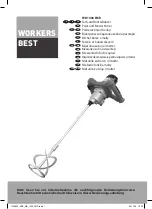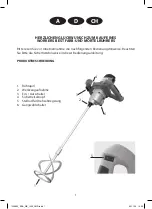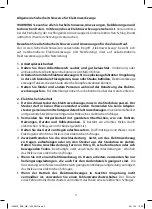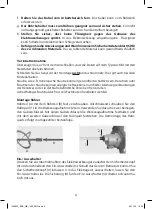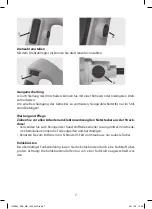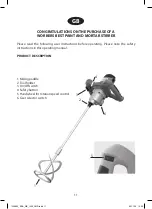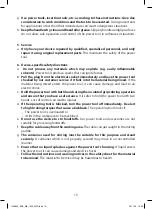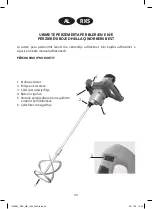
General safety directions for power tools
WARNING! Read all safety directions, instructions, illustrations and technical data
that accompany this power tool. Failure to heed the instructions given below could
cause an electric shock, burning and/or serious injuries.
Keep all safety directions and instructions in a safe place for future reference.
The term „power tool“ used in the safety directions refers to mains-powered electrical
tools (with power cord) and to battery-powered electrical tools (without power cord).
1. Workplace safety
a. Keep your work area clean and well-lit. Untidiness and poorly lit workspaces can
lead to accidents.
b. Do not work with the power tool in a potentially explosive environment, in
which combustible liquids, gases or dusts are located. Power tools produce sparks
that can ignite dust or fumes.
c. Keep children and other persons at a safe distance when using the power tool.
Distractions can cause you to lose control of the device.
2. Electrical safety
a. The connecting plug of the power tool must fit into the power
outlet. The plug may not be modified in any way. Do not use adapter
plugs in conjunction with grounded power tools. Unmodified plugs and suitable
power outlets reduce the risk of electric shock.
b. Avoid physical contact with grounded surfaces, such as pipes, heaters, stoves,
and refrigerators. There is a higher risk of electric shock when your body is grounded.
c. Keep the device away from rain or moisture. The penetration of moisture into an
electric device increases the risk of electric shock.
d. Do not use the connecting lead for any purpose other than its intended purpose;
do not use the connecting lead to carry or hang up the device or to pull the plug
out of the power outlet. Keep the connecting lead away from heat, oil, sharp
edges, or moving parts. Damaged or tangled connecting leads increase the risk of
electric shock.
e. If you work with a power tool outdoors, only use extension cords that are
approved for outdoor use. The use of an extension cord that is approved for outdoor
use reduces the risk of electric shock.
f. If you cannot avoid operating the power tool in a damp environment, use a
residual current circuit breaker. The use of a residual current circuit breaker reduces
the risk of electric shock.
3. Personal safety
a. Be attentive and aware of what you are doing; proceed with caution when
working with a power tool. Do not use the power tool if you are tired or under
the influence of drugs, alcohol or medication. One moment of carelessness while
using the device can lead to serious injuries.
13
1223852_BDA_WB_1400_FMR.indd 13
1223852_BDA_WB_1400_FMR.indd 13
02.11.20 12:50
02.11.20 12:50

